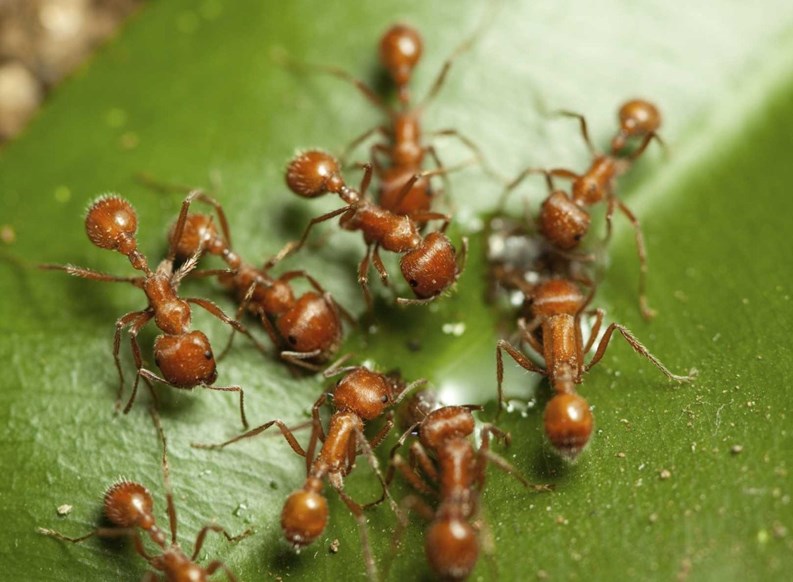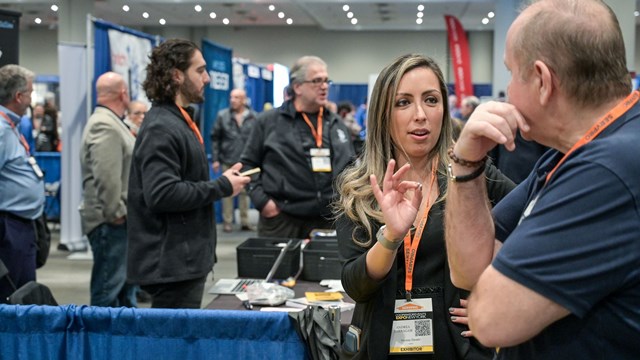In 1513, conquistador Juan Ponce de Leon landed in what would eventually become St. Augustine and promptly staked a claim for Spain. The Spaniards found the peninsula teeming with life—plants, birds, fish—and insects of all descriptions. Nearly 500 years later, the battle is still on between mankind and the myriad insects in the animal kingdom.
Florida’s subtropical climate, short mild winters, and abundant wetlands and marshes are paradise for man and bug alike, and while the insects don’t seem to mind sharing, mankind has developed an entire industry to eradicate these insect interlopers.
What product is applied, by whom, where and when, is a major concern and expense for property management companies. In the state of Florida there is no easy one-size-fits-all answer on how to manage all things entomological. Fortunately, there are resources statewide.
The Florida Cooperative Extension Service
The University of Florida Institute of Food and Agricultural Sciences (IFAS), along with Florida A&M University (FAMU), has had entomology and nematology programs (the study of insects and worms, respectively) in place since 1915, according to professor John Capinera, chairman of UF’s entomology and nematology department. Under that umbrella is The Florida Cooperative Extension Service (FCES). The FCES is a partnership between state, federal, and county governments. The IFAS Extension has an office in every county in order to provide scientific knowledge and expertise to the public. Counties have been grouped regionally into five districts in order to meet the needs of the local communities with programs for the public and training and certification for professional pest control operators.
The Cooperative Extension service is a nationwide educational network. Trained professionals in each office work both locally and statewide, sharing resources and information with each other and the public they serve. The University of Florida website (www.ifas.ufl.edu) links it all together.
Vicki Hutto, president and CEO of VIP Pest Control is well aware of the educational benefits available through Pasco County Cooperative Extension Services. Hutto and partner Deborah Long are both Certified Pest Control (CPO) operators. Certification and training received in Pasco County has equipped the team with the knowledge and ability to service a five-county radius in the Tampa Bay area.
The Tropical/Southern Zone
Mary Lamberts, Ph.D. teaches pesticide training for certification for pesticide operators in the Miami-Dade Extension office. Miami, in the tropical zone, is home to both an international airport and seaport, where thanks to modern transportation and shipping, a new species of insect is introduced each month on average. Because of that distinction, Dr. Lamberts, describes this zone as “ground zero” for the battle against insects.
Professor Capinera agrees, adding that “Florida is at the epicenter of the influx of insects to the continental U.S.” An example of this is the newest arrival on the scene; a flying insect called a Psyllid, which affects citrus trees. Though it has more of an impact on industry than residential communities, its proliferation and impact is a good example of how recently-arrived bugs can cause havoc and damages once they reach our shores.
Because of this, the Miami-Dade County Extension focuses on educational outreach through various methods including, workshops, seminars, group meetings, video conferences, field demonstrations, websites and educational handouts.
Adrian Hunsberger, an urban horticulture agent with the extension services, has narrowed the field on common pests. “There are 10,000 species of insects in Florida,” according to Hunsberger, “but only about 50 of them are considered pests. Not everything needs to be treated, there are many beneficial insects. Chinch bugs in Saint Augustine grass is probably the number-one pest complaint, and that's often the result of over watering and too much nitrogen.” Treating with insecticidal soap can usually prevent major sod replacement if caught early enough.
Hunsberger cautions that “over-pampering,” such as over watering and/or over fertilization is counterproductive and actually invites pest and disease. She does not recommend going overboard with aggressive preventive or proactive treatments, but rather using a “wait and treat” approach when a problem actually presents itself. “The right product at the right time of year in the right quantity will help build plants and turf that are pest-resistant and healthy,” she says. When working with local HOAs and condos, Hunsberger encourages what she calls “Florida-friendly landscaping” and weighing the environmental cost associated with each turf, shrub, tree, or ornamental plant. “Always consult your extension service,” she advises, “and ask your lawn and pest providers if they attend extension training and workshops.”
Hunsberger also writes a weekly column for the Miami Herald covering frequently asked questions pertaining to Florida landscape and pest control.
The Central Zone
The Tampa Bay Area, generally considered Hillsborough, Pinellas, Polk, Pasco, Manatee, Citrus, and Sarasota Counties, is located in the central growing zone where temperatures are nearly as high year round as those in the southern and tropical zones. Humidity is similar as well, but rainfall is somewhat less overall. Tampa Bay is also ranked the second most populous metropolitan area in Florida (after the South Florida metro area). Much of this area’s population lives in deed-restricted, gated communities or condominiums and relies on property management groups for lawn, landscape and pest maintenance.
Chris Dewey is the Florida Friendly Landscaping Program Coordinator for Pasco County Cooperative Extension. He specializes in working with builders, developers, and HOA/COA communities. His office offers educational services in Pasco through a three-way cooperative arrangement between the Board of County Commissioners, the University of Florida, and the United States Department of Agriculture.
Dewey lists 480 HOAs in Pasco County; more than enough to keep him occupied. He often arranges panel discussions with landscape contractors, HOAs/COAs, property managers, and CONA (Council of Neighborhood Associations) in an effort to effectively share important information. Like his counterparts in the Miami-Dade region, Dewey does not believe in aggressive proactive treatment. He teaches ‘Integrated Pest Management” (IPM) as a basis for landscape management and an alternative to broad spectrum chemical treatments. IPM identifies the pest or disease afflicting a lawn or landscaping scheme and targets treatment with the least toxic product necessary to do the job. By contrast, Dewey says that a broad spectrum approach sets out to essentially “kill everything” pesky on a set seasonal schedule.
“You are paying for knowledge, not just application,” he explains. “Science can justify using 80 percent of the pesticide and saving 20 percent of the cost.” Dewey recommends hiring one company for cutting, pruning, irrigating and spraying, instead of three or four different providers. Additionally, he recommends that condos and HOAs develop one specific contract in detail rather than sign the generic one generally offered by service providers. “Industry statics show that 15 percent of property value is landscaping,” he says. “Don’t settle for a contract that just mentions 'fertilizer,'” he warns. “List the product, application frequency and scheduled times you agree on.”
According to Dewey, the most frequent pest complaint in this zone are aphids and scale bugs—both sucking insects that target Crepe Myrtle trees and Hibiscus shrubs. Dewey recommends non-toxic oils as a preferred treatment and even supplies a recipe: Two tablespoons of baby shampoo, two tablespoons of vegetable oil and a gallon of water. Effective, chemically mild, and safe—unless you are an aphid or a scale bug!
Chinch Bugs are the biggest problem for turf grass, usually Saint Augustine, and prevention with proper watering and fertilization is always the first line of defense. After an infestation, removing the thatched grass and treating with insecticidal soap is recommended.
According to Hutto, termite treatment is also an ongoing concern for many of VIPS’s customers, followed closely by ants and mosquitoes. Hutto has had good results with organics and is particularity impressed with Shawano Organic products. Her company provides services for both private residences and HOA/COA managed properties and has long considered the Extension Cooperative Services a valuable resource.
The Northern Zone
Pensacola, in Escambia County, is in the state's panhandle area. Bordered on the south by the Gulf of Mexico and on the north by Alabama and Georgia, this area of the state experiences a more traditional change of seasons than other parts of Florida. Horticulture Agent Elizabeth Bolles is a trained entomologist and has been part of the Cooperative Extension serving this area for 14 years.
Bolles uses all the modern social media to reach her audience. A quick check of the IFAS site lists instructional YouTube videos, and Facebook as resources. Recent classes offered training and recertification for pesticide applicators.
Bolles says she finds that the professional markets are still favoring more aggressive chemical-based approaches to pest control, but that the interest in using less toxic soaps and oils is growing. This is particularly true for HOA residents and board members interested in gardening with children.
As the shift continues, Bolles says she finds that education is the best tool for obtaining satisfactory outcomes. “The palm tree that grows well in Miami might not survive a panhandle winter,” she says. “Choose the right plant and respect the eco-structure.” This advice serves property managers as well and can save valuable community resources.
Bolles see the same pest problems as her counterparts further south, chinch bugs, nematodes, and grubs invade Saint Augustine and Centipede lawns as a result of poor turf management. Scale bugs are the most prevalent pest for trees and shrubs. She says she would like to see both private citizens and professional pest control operators use the extension centers resources before undertaking any landscaping or treatment plan of action.
Her final piece of advice for Florida landscapers and pest operators pretty well sums up the best approach to property managers statewide: “Always consult your local extension office—the information you receive is research-based and unbiased.”
Anne Childers is a freelance writer and travel agent living in Tampa.





Leave a Comment